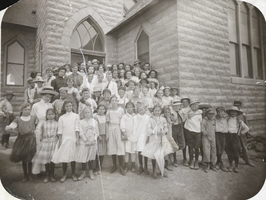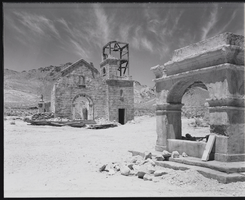Search the Special Collections and Archives Portal
Search Results
Trinity Church
Authority Link
No description.
Latitude/Longitude
Feature
Geographic Location

Photograph of schoolchildren and teachers, Las Vegas, Nevada, circa 1910s
Date
Archival Collection
Description
Image

"The Reward" film set, image 001: photographic print
Date
Archival Collection
Description
Image

Antioco Carrillo interview, 2019: transcript
Date
Archival Collection
Description
Interviewed by Monserrath Hernández, Rodrigo Vazquez, and Laurents Benitez-Bañuelos. A native of Jalisco, Mexico, moved to Las Vegas when he was about 20-year old in 1987. Attended CSN and UNLV. His history with Las Vegas is embedded in the 1980s Las Vegas gay scene and education for AIDS. He is and activist and the Executive Director of Aid for AIDS of Nevada. He and Theodore Small are the first same-sex marriage in Nevada.
Text
Alex X. Porter oral history interview
Identifier
Abstract
Oral history interview with Alex X. Porter conducted by Claytee D. White on April 16, 2022 for the African Americans in Las Vegas: A Collaborative Oral History Project. In this interview, Porter mainly discusses his membership of and devout role in the Nation of Islam. He discusses how he became involved with the religion after trying to enact change in the Black community through the NAACP. He discusses how his stance on education sets him apart from the majority of the Black community; he believes that a college degree is not necessary to teach intellectual topics to young people. Porter is active in the Las Vegas Black community as either a member or supporter of the Minister's Alliance, Shepherd's Breakfast, NAACP, Black Lives Matter, and the Nation of Islam.
Archival Collection
Emma Ellsworth oral history interview
Identifier
Abstract
Oral history interview with Emma Ellsworth conducted by Clark Ellsworth on March 4, 1980 for the Ralph Roske Oral History Project On Early Las Vegas. Ellsworth first talks about getting married and moving to Pioche, Nevada during the Great Depression. She also talks about raising a family in Las Vegas, Nevada and about her husband working at Beneficial Life, a life insurance company. She also discusses Mormon churches in Las Vegas. She also discusses Mormon churches in Las Vegas.
Archival Collection
Ina Porter oral history interview
Identifier
Abstract
Oral history interview with Ina Porter conducted by Claytee White on January 05, 2010 for the Voices of the Historic John S. Park neighborhood oral history project. Porter recalls moving to the John S. Park Neighborhood in the 1940s. She describes how they helped build the Mormon Church and the importance of the Latter Day Saints Church to the John S. Park Neighborhood. Lastly, Porter discusses the changes in the John S. Park Neighborhood over fifty years.
Archival Collection

Transcript of interview with Theda Kay Grinnell by Fletcher Corey, February 28, 1977
Date
Archival Collection
Description
On February 28, 1977, Fletcher Corey interviewed Theda Kay Grinnell (born 1935 in New London, Iowa) about her life in Las Vegas, Nevada. Grinnell first talks about her move to Nevada and both her and her husband’s work at the Nevada Test Site. She also talks about the atomic blasts, competition with Russia, and her employment that followed her work at the Test Site. Grinnell later talks about her church membership and goes into detail about the race riots and how they involved and impacted her and her son. The end of the interview includes discussion on flash floods, the culinary union, how World War II affected the Las Vegas industry, and the social changes in Las Vegas.
Text

Luella Knuckles interview, February 28, 1980: transcript
Date
Archival Collection
Description
On February 28, 1980, Paul Gentle interviewed Luella Knuckles (b. 1910 in Impolla, Texas) about life as an African-American in Las Vegas, Nevada. Knuckles talks to Gentle about the conditions that African-Americans lived in and the discrimination they faced when first arriving to the city. Knuckles, in particular, spends a portion of the interview discussing the segregated layout of Las Vegas and the jobs and opportunities that were available for the black community in a segregated town. Moreover, she provides anecdotes about her deceased husband’s employment, their experience buying and repairing a property by themselves, and the changes in attitudes as the city desegregated. The conversation later focuses on the Church’s place in the African-American community, education and participation in church activities, and Knuckle’s personal love for books and Bible study.
Text

Loreta C. Monson interview, March 1, 1979: transcript
Date
Archival Collection
Description
On March 1, 1979, Jon J. Howard interviewed Loreta Monson (b. April 10, 1904 in Egypt, Idaho) about her life in Las Vegas, Nevada. Monson speaks about coming to Las Vegas, the layout of the city and Fremont Street. Moreover, Monson talks about the Mormon church in Las Vegas, politicians and Nellis Air Force Base. Lastly, Monson discusses leisure activities, recreational activities such as fishing, and the Old Ranch.
Text
